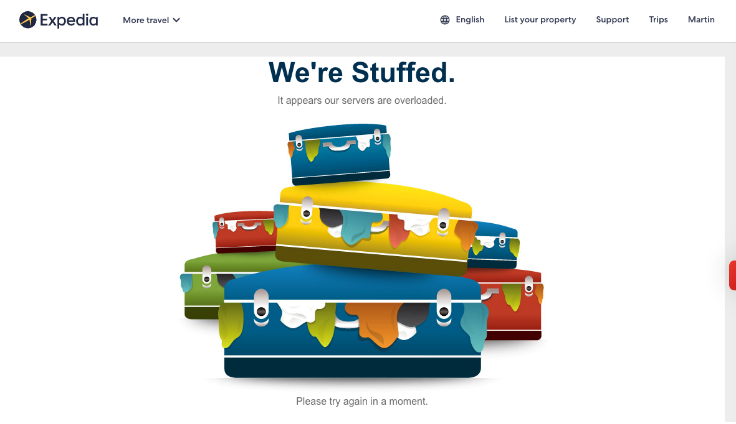Martin James, vice president EMEA at Aerospike, sets out what travel brands can do to future-proof themselves to avoid crashes amid the explosion of data
_w=800_h=630.png?v=20230522122229)
Guest Post: Your website doesn’t have to be stuffed when customer demand soars
A collective groan of frustration must have been heard in households across the UK in July as British
Airways announced it was cancelling over 10,000 flights until October, affecting a million passengers. And this was just the BA flights at Heathrow, prompted by the airport’s cap on passenger numbers.
Across the country, multiple airlines have cut scheduled flights as they struggle to meet holiday demand and find staff following the pandemic-induced lay-offs.
While passengers have the right to compensation and refunds, this is small consolation for the disruption and worry.
Not to mention the disappointment of missing their longed-for holiday or important work trip.
Frustrated, most have opted to try and find an alternative flight that would get them to their destination.
Unfortunately, the numerous cancellations and subsequent rebookings have had a ripple effect across the industry that now seriously affects the technology platforms that support ancillary services. This is causing customer ire and eroding brand loyalty.
I found this out to my cost when, after having flights for both work-related and holiday trips cancelled, I decided to search Expedia for alternatives.
Regrettably, the unprecedented demand of fellow passengers frantically rebooking flights, accommodation, and car hire had caused the site to crash. This is what I saw:

This unequivocal explanation, admirable in its honesty, indicates two things.
One is the sheer number of people whose summer plans have been disrupted; the second is the lack of proper technology being used by Expedia to enable fast, accurate real-time transactions to flow, even at this unprecedented level of demand.
Avoiding site crashes
Expedia is not alone, web sites crashing due to overload occurred across the travel industry this summer.
Another victim was the fast-track passport application service which, according to reports, went down for hours in April.
The launch of a site making a railcard available to Millennials in 2018 crashed within minutes of opening.
These site crashes could all have been avoided. Real-time data platforms are designed to withstand such demands, providing predictable sub-millisecond performance with low latency at the gigabyte-to-petabyte scale.
This means that customers experience no delay as they navigate a website. Services, such as Expedia, can transmit huge amounts of data to and from customers as and when it is needed without interruption.
Many sectors operate in The Right Now Economy - among them banks and finservs, mobile phone companies, streaming services, and online retailers.
We can see from the events of the past few months that airlines and travel companies also need a response to the increasing pressure of consumer demand.
Managing a crisis is the tip of the iceberg. Customers are looking for fast, accurate digital transactions every day, and if they fail to receive them, they will quickly look for an alternative provider.
Real-time data is the answer to meeting customer requirements. Whether it’s everyday requests for fast-changing flight information or the processing of payments, there is an increasing need for ‘right-now decisioning’, which demands processing a huge amount of constantly moving data at an enormous scale.
Leveraging a real-time data platform as the core of the modern data stack allows for fast, accurate outcomes at any scale.
It’s helpful to put this into context and break down the transactional steps that customers and service providers go through.
A customer should be able to search for a flight, a car for hire, or accommodation and receive results in seconds. Having made a choice, they can make a secure online payment in milliseconds.
They then receive real-time updates until they have final confirmation that their holiday is booked and paid for. Every aspect of this process falls into the real-time data bracket.
Future-proofing for the data explosion
Given the explosion in data and every indication that its volume will double every two years moving forward, businesses must prepare for tomorrow today.
It’s not a coincidence that the market leaders across every sector, including PayPal and Criteo, have standardised their infrastructure on real-time data platforms that compute data at a petabyte scale.
The travel industry has had some tough challenges this year, and the outcome is likely to mean a change in many of its processes.
Among these should be a reassessment of the technology platforms it relies on to deliver essential digital services.
If it wants to nurture loyalty, increase customer satisfaction, and ultimately provide value for shareholders, serving up a website that is vulnerable to crashing when demand grows is not the way to go.



